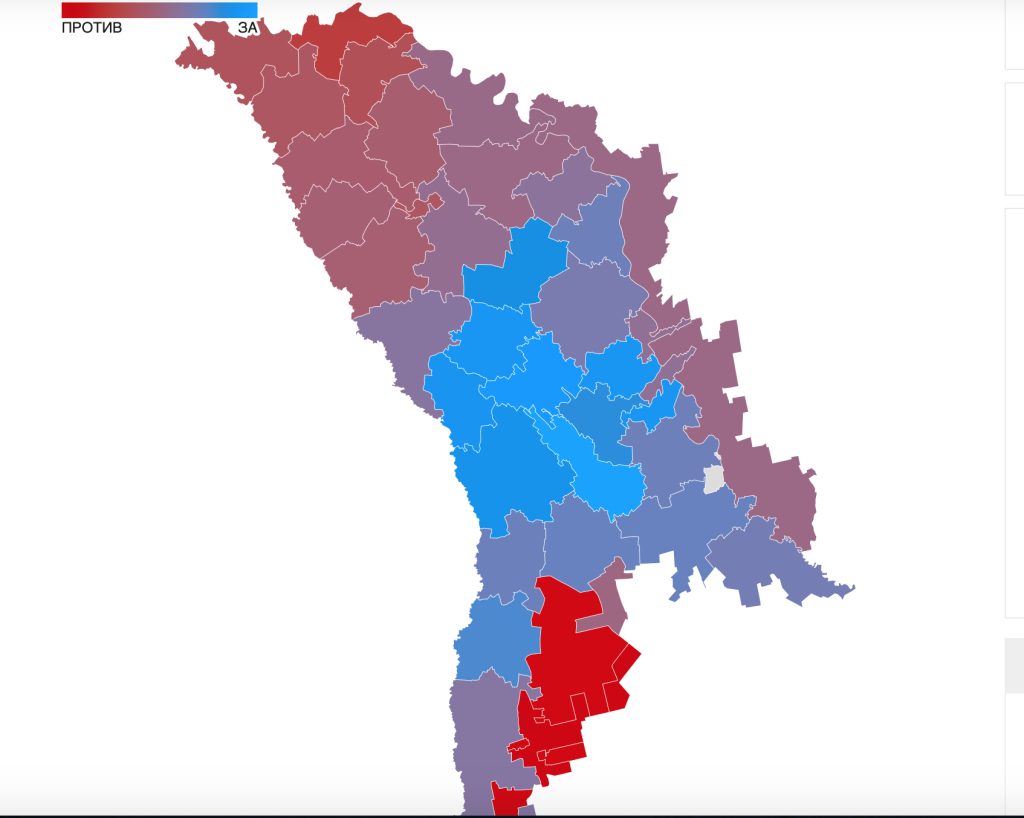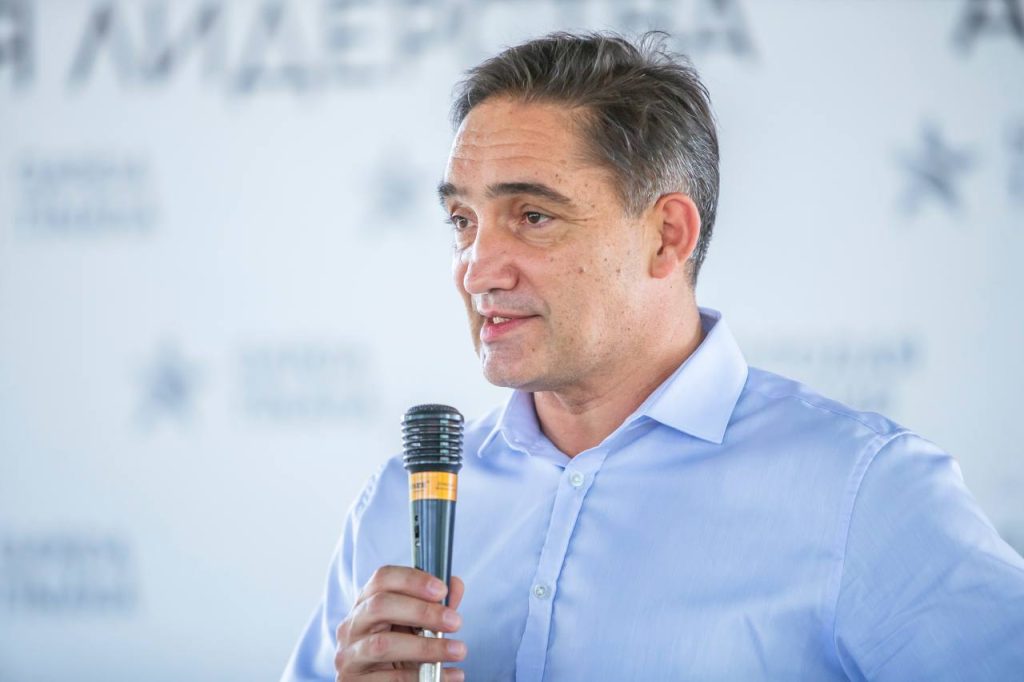50/50: How referendum results will shape Moldova's path to the EU
Referendum in Moldova
Material provided by JAMnews partner NewsMaker.md
In a recent referendum on European integration, supporters of Moldova’s EU aspirations faced a less-than-optimistic outcome, with the number of votes in favor barely exceeding 50 percent. Brussels congratulated Moldova on what it deemed a victory, but the referendum did not reflect the anticipated broad support for EU integration; instead, it highlighted a significant societal divide.
This article from NM explores how this will affect Moldova’s Euro-integration efforts and negotiations with the EU.
50/50
On October 20, Moldova held the first round of presidential elections alongside a referendum initiated by President Maia Sandu to amend the constitution in favor of Euro-integration. The ruling Party of Action and Solidarity (PAS) actively backed the referendum, and an informational campaign began months before the vote. Polls indicated that more than 50 percent of respondents were inclined to support the referendum.
Ultimately, however, the “yes” option narrowly edged out the “no” option, with 50.35 percent of voters in favor of the constitutional amendments and 49.65 percent opposed.
Notably, in most districts of Moldova, the majority of voters cast their ballots “against,” with only a few central regions and Chișinău showing a majority in favor. Additionally, a significant portion of supporters for the constitutional amendments on Euro-integration live outside Moldova.
On the night after the referendum, preliminary results indicated that the “against” option was winning, but the situation began to change as the ballots from the diaspora were processed.
Referendum on Moldova’s EU membership
Voting results from polling stations

It is worth noting that, according to the same polls, more respondents were more willing to support Euro-integration rather than the constitutional amendments regarding the European course. Sociologist Alexander Barbarosie explained this hesitation by pointing out that people are wary of changing the country’s fundamental law. Additionally, many politicians who identify as pro-European called for a boycott of the referendum, viewing it as a political tactic to mobilize President Sandu’s electorate.
Lowest result so far
Before joining the EU, many countries held national referendums on support for Euro-integration. Moldova recorded the lowest results. A slight majority also supported Euro-integration in Sweden and Malta, with 52 percent and 53 percent, respectively. In Slovakia, however, 93.71 percent voted in favor in a similar referendum, while Hungary saw 83.76 percent support. Switzerland, following its 2001 referendum, ultimately rejected EU membership, with only 23.2 percent voting in favor and 76.8 percent against. That decision led Switzerland to enshrine its permanent and unchangeable status of neutrality in law.
Such a referendum is not mandatory for candidates seeking EU membership. For example, Cyprus, Bulgaria, and Romania joined the EU without holding a referendum.
Moldova, however, conducted its referendum just a few months after beginning negotiations with the European Union about membership.
Europe congratulates, opposition threatens
Despite the uncertain outcome, European officials congratulated Moldova on its “European choice.” Romanian Member of the European Parliament Siegfried Mureșan stated that the referendum results would encourage Europe to modernize the country. “The result of the referendum does not mean that Moldova is divided; it shows that, despite propaganda and the extensive involvement of the Russian Federation, people found the strength to choose Europe,” the MEP said.
European Parliament President Roberta Metsola wrote on social media platform X (formerly Twitter): “Bravo, Republic of Moldova, thank you for your courage.”
European Commission President Ursula von der Leyen congratulated the people of Moldova and President Maia Sandu on their “European choice,” noting that “even in the face of hybrid tactics from Russia, Moldova has shown that it is independent, strong, and wants a European future.”

Meanwhile, former Prosecutor General Alexander Stoianoglo, who advanced to the second round of the presidential election alongside Maia Sandu, noted that the referendum results are so contentious that they are unlikely to be considered legitimate.
Stoianoglo identifies as a supporter of Euro-integration, despite running as a candidate for the pro-Russian Party of Socialists. He argues that the referendum had nothing to do with Euro-integration and was merely a PR stunt by Sandu.

Is a “Georgian scenario” possible?
The unexpectedly weak results of the referendum raise questions about the potential for a “Georgian scenario.” Georgia has long and consistently sought EU membership. However, the ruling party, Georgian Dream, has altered this trajectory. Tbilisi has begun to align more closely with Moscow and has enacted laws that Brussels criticizes, such as a “foreign agent” law similar to Russia’s. This shift has led to protests in Georgia.
Political analyst Dionis Cenușă believes that a “Georgian scenario” is unlikely in Moldova, as Georgia has an oligarchic regime while other political forces are pro-European. Moldova, he argues, is a more complex case, with a different balance of power among its political factions.
“First, the current government could declare all political forces linked to [fugitive oligarch Ilan] Șor unconstitutional or disqualify them, thereby excluding them from the upcoming 2025 parliamentary elections. Second, the ruling party could create ‘clones’ to attract disillusioned voters and divert them from pro-Șor factions.
Third, various political parties may gain seats in parliament after the elections, leading to a coalition government. This is another aspect that is atypical for Georgia, where one party has monopolized power, as is currently the case in Moldova,” the expert explained.
Cenușă added that one of the key factors influencing the dynamics of the 2025 parliamentary elections will be the future president. “If Sandu is reelected, she will try to help her party, PAS, gain a majority in parliament.
In contrast, a victory for Stoianoglo would mean a confrontation between the presidential administration and PAS, highlighting the government’s shortcomings before the West.
In this case, the political standoff between different state institutions in Moldova would clearly benefit Russia, whose influence would grow in an atmosphere of destabilization,” Cenușă noted.
No problems expected
Experts believe that there should be no changes in Moldova’s relationship with the EU in the current situation. “They [European officials] are looking at the referendum results realistically. In Brussels and Strasbourg, there is an understanding of the level of hybrid threats directed against Moldova, which motivates them to quickly implement the ‘von der Leyen plan,'” noted WatchDog expert Andrei Curelaru.
He suggests that we may not see significant EU funding in Moldova’s budget before the parliamentary elections, as pro-European parties will need to prove to Brussels that they are capable of forming a government.
Dionis Cenușă contends that the contentious referendum results cannot affect the speed of negotiations for EU membership. He also believes that the constitutional changes resulting from the referendum will be contested by opposition forces and certain segments of the public. “With only 25 percent support [from all registered voters], of which 180,000 are diaspora members, confidence in the [constitutional] reform is shaky,” Cenușă noted.
He emphasized that “Brussels cannot afford to criticize the referendum results.” “If the EU adopts a critical stance, it will impact Sandu’s chances of reelection. Acknowledging that only 25 percent of Moldovans voted ‘yes’ for Euro-integration, including 180,000 from the diaspora, could damage the EU’s image in Moldova,” he added.
Negotiations for EU membership will continue, stressed former Moldovan representative to the UN and Council of Europe Alexei Tulbure. “It’s clear that different figures were expected, but the results were influenced by both Russian interference and the organizers’ mistakes. The EU is not discussing these mistakes and is focusing on Russian meddling. This shows their commitment to continue supporting Moldova in its European path.”
Tulbure believes that the referendum results may not be the issue, but rather the results of the second round of elections. “We could have surprises here: if Sandu is not reelected, I think this could have consequences for our European trajectory,” the expert concluded.
Referendum in Moldova


















